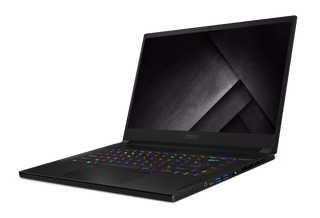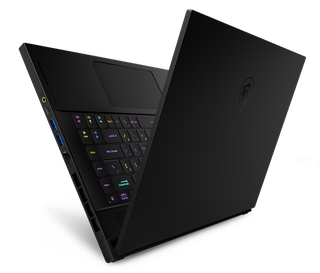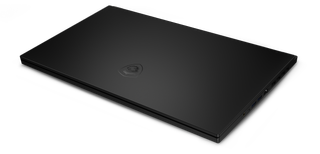MSI's GS66 Stealth shows us what next-gen ultrathin gaming laptops can do
Early indicators are good for powerful but quiet next-gen laptops.

The idea of the thin and light gaming laptop has been bouncing around for years, and there have been plenty of manufacturers that have managed the feat, with some great machines from the likes of Asus, Dell, Razer, MSI, and many more. The problem is that while a lot of these pack the finest components into their super-thin chassis, they can get loud when you really push them.
There have been a few exceptions though, and one machine that has stood out from the crowd for it's whisper quiet operation is the MSI GS65 Stealth. We loved the original MSI GS65 Stealth Thin when we reviewed it back in May 2018, and we liked the refresh, the MSI GS65 Stealth Thin (2019) that shipped last June as well. So when MSI offered us an engineering sample of its up and coming GS66 Stealth, we jumped at the chance.
For the most part, this looks identical to the previous GS65, but instead of gold highlights, it's all black. The star of the engineering sample is the 10th gen Intel processor, the Core i7 10750H to be exact. This is a 6-core, 12-thread CPU that has a base frequency of 2.6GHz, a max frequency of 4.8GHz across all its cores, and a potential top single core frequency of 5GHz.

As this is an early engineering sample it's hard to say for sure how fast this CPU will go, but the fastest I recorded across days of testing was slightly shy of the single core Max Turbo frequency, but it lined up with the multi-core frequency. It may be that MSI has held back a little in order to keep the noise levels down, which I have absolutely no problem with.
The rest of the specifications makes for a tempting machine, with 32GB of DDR4-2666 RAM, a fast 512GB NVMe SSD and a 240Hz 1080p panel that looks great. There are several versions of the GS66 Stealth on the way, with the graphics subsystem being one of the defining factors. This engineering model had an RTX 2060 as a placeholder (with older drivers that couldn't be updated), although the shipping machine will have either an RTX 2060 Max-Q or an RTX 2080 Super.
We can't print the results of the benchmarking we did on this machine, because firstly it's an engineering sample, and thus not finished, but also because there's an embargo on performance results from both Nvidia and Intel until the 15th April. There's also a rather important missing element from this machine, and that is the GPU. So I'll be revisiting this machine just as soon as it's in production to see how it performs.
While the performance and responsiveness of the machine are great, the thing that blew me away the most was how quiet it was in use. Push it hard and it continues to keep its noisy side in check. It's not absolutely silent under load, but even when the fans do kick up a gear, they are only just audible. Can MSI keep the noise levels this low with such a high-end GPU? I can't wait to find out.
PC Gamer Newsletter
Sign up to get the best content of the week, and great gaming deals, as picked by the editors.

So not everything is exactly as it will ship, which made it all the more surprising to find that MSI had set aside time to install Norton Antivirus onto it's otherwise gorgeous machine. Far more welcome was MSI's Dragon Center, which enables you to switch between various User Scenarios, which essentially pitches noise against performance. We did experiment here a little, although found the "Balanced" setting worked best.
As for the rest of the machine, the Steelseries keyboard looks good and is responsive, and that screen is also another plus point. It looks great from a range of angles, although whether you actually need a 240Hz screen is another question entirely. I was less impressed with the touchpad, which is large, but tricky to register clicks with. Still the chassis is sturdy, and I'm definitely a fan of the subdued styling.
The bottom line is that the MSI GS66 Stealth is a deeply impressive laptop, and like its predecessors could do very well. The biggest problem for MSI right now, and indeed any manufacturer, is those new $999 RTX 2060 gaming laptops that could make this seem incredibly expensive. We'll have to wait and see if the extra performance makes up for it.
Alan has been writing about PC tech since before 3D graphics cards existed, and still vividly recalls having to fight with MS-DOS just to get games to load. He fondly remembers the killer combo of a Matrox Millenium and 3dfx Voodoo, and seeing Lara Croft in 3D for the first time. He's very glad hardware has advanced as much as it has though, and is particularly happy when putting the latest M.2 NVMe SSDs, AMD processors, and laptops through their paces. He has a long-lasting Magic: The Gathering obsession but limits this to MTG Arena these days.
Most Popular






